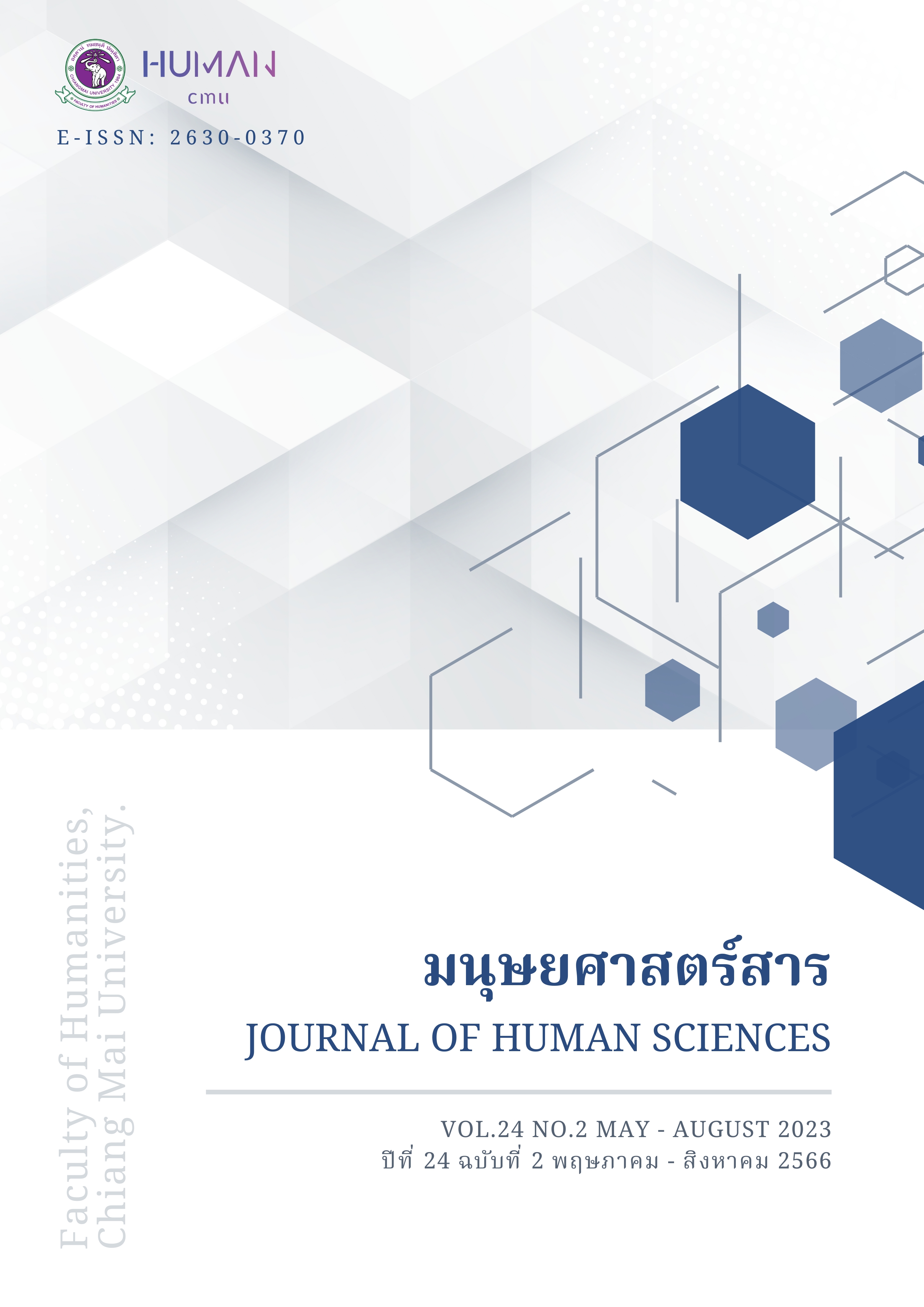Jiddu Krishnamurti: ครูในฐานะพลเมืองโลก
Main Article Content
บทคัดย่อ
บทความนี้สำรวจความเกี่ยวข้องกับมนุษย์ในแง่มุ่งหวังไปที่ความเป็นพลเมืองโลกโดยการตรวจสอบบางแนวคิดเมตาฟิสิกส์และการเขียนปรัชญาที่ได้รับการละเลยอย่างร้ายแรงในบริบทการแพร่ระบาดของ Covid19 ในยุคที่ผ่านมานี้ การวิจัยเร็ว ๆ นี้ได้สังเกตเห็นว่ามีระดับของ "ความเครียดหลังจากการแพร่ระบาด" ที่เรียกว่า "บาดแผลจิตใจ" ที่มีผลกระทบกลับตัวและพลเมืองโลกได้ถูกเชื่อมโยงส่วนต่าง ๆ ของสังคมอย่างพร้อมเพรียงกัน
การวิจัยนี้วิเคราะห์งานเขียนส่วนบุคคลของนักปรัชญาจิตดุษฎีชื่อ Jiddu Krishnamurti (1895-1986) ที่เน้นไปที่ผู้อ่านเยาวชนได้แก่ "สุขสบายคนที่ไม่มีอะไรเลย", "จดหมายถึงเพื่อนสาววัยเยาว์" (1948-1960) และบันทึกประจำวันที่เผยแพร่ใน "สมุดบันทึกของ Krishnamurti" (1961-1962) แม้ว่าเป็นบทความที่มีลักษณะส่วนบุคคล แต่งานเขียนเหล่านี้เปิดเผยข้อความสากลของนักปรัชญาว่า "ครูสากล" ไม่จำเป็นสำหรับความสงบและการเข้าใจตนเอง และผู้เขียนจะพิสูจน์ว่ามันเชื่อมโยงกับ "พลเมืองโลก"
มีข้อเสนอแนะว่า การอ้างอิงถึงศิลปะของ Krishnamurti เป็นวัสดุที่เหมาะสมสำหรับผู้ศึกษาและมนุษยชาติโดยทั่วไปในการวิเคราะห์ "พลเมืองโลก" ในยุคหลังการแพร่ระบาดที่เป็นก้าวหน้าในปัจจุบัน การวิเคราะห์นี้ใช้เอกลักษณ์ชีวประวัติของ Krishnamurti และการติดตามบริบทประวัติศาสตร์ นำเสนอการประเมินวิจารณ์ที่สำคัญและวรรณกรรมของผลงานสำคัญของเขาในบทความนี้ จากนั้น นำเสนอการวิเคราะห์เชิงหัวข้อระหว่างผลงานเหล่านี้กับข้อความของ "พลเมืองโลก"
Article Details

อนุญาตภายใต้เงื่อนไข Creative Commons Attribution-NonCommercial-NoDerivatives 4.0 International License.
เอกสารอ้างอิง
(1929, 4 August). Krishnamurti Ends Order Of The Star; Theosophists' Society Dissolved Because Leader Believes Followers Ignore 'Truth'. New York Times. A1.
Aberbach, D. (1993). Mystical Union and Grief- The Ba'al Shem Tov and Krishnamurti. The Harvard Theological Review, 86(3), 309-321.
http//www.jstor.org/stable/1510013
Aveling, H. (1990). Krishnamurti on Education. Social Alternatives, 9(1),33-36.
Blau, E. (1995). Krishnamurti 100 Years. Stewart Tabori & Chang.
De Sousa, A. (2012). Mind and Consciousness as per J. Krishnamurti. Mind in Indian Thought, 10(1),198-207.
Fisk, L. (1994). Jiddu Krishnamurti: Violence as a resistance to factuality. Peace Research, 26(2), 85-102. https://www.jstor.org/stable/23607349
Fouéré, R. (1969). Krishnamurti the Man and His Teaching. Chetana.
Gertel, E. B. (2002). Krishnamurti, Language and Biblical ‘Remembrance’. Religious Studies and Theology, 21(2), 49–67. https://doi.org/10.1558/rsth.v21i2.49
Gopal, M. (1995). Krishnamurti and Spirituality- A Comment on Wren-Lewis’s View. Journal of Humanistic Psychology, 35(1), 89–96.
Robert Huish (2021) Global citizenship amid COVID-19: why climate change and a pandemic spell the end of international experiential learning, Canadian Journal of Development Studies / Revue canadienne d'études du développement, 42(4), 441-458.
Kola, L., Kohrt, B. A., Hanlon, C., Naslund, J. A., Sikander, S., Balaji, M., Benjet, C., Cheung, E., Eaton, J., Gonsalves, P., Hailemariam, M., Luitel, N. P., Machado, D. B., Misganaw, E., Omigbodun, O., Roberts, T., Salisbury, T. T., Shidhaye, R., Sunkel, C., Ugo, V., … Patel, V. (2021). COVID-19 mental health impact and responses in low- income and middle-income countries: reimagining global mental health. The lancet. Psychiatry, S2215-0366(21)00025-0. Advance online publication. https://doi.org/10.1016/S2215-0366(21)00025-0
Krishnamurti, J. (Alcyone) (1910). At the Feet of the Master. Rajput Press.
Krishnamurti, J. (1964). The Krishnamurti reader. Arkana.
Krishnamurti, J. (1975). The First and Last Freedom. Harper One Publishers.
Krishnamurti, J. (1976). Beginnings of Learning. Gollancz Publishers.
Krishnamurti, J. (1976). Krishnamurti’s Notebook. Gollancz Publishers. Kindle Edition.
Krishnamurti, J. (1979). The Wholeness of Life. HarperCollins.
Krishnamurti, J. (1983). The Flame of Attention. Harper Row Publishers.
Krishnamurti, J. (2001). You are the World. Krishnamurti Foundation.
Krishnamurti, J. (2001). On Education. Krishnamurti Foundation of Amer.
Krishnamurti, J. (2005). Facing a World in Crisis: What Life Teaches Us in Challenging times. Shambhala.
Krishnamurti, J. (2010). Freedom from the Known. Rider Books.
Krishnamurti, J. (2020). Happy is the One Who is Nothing, Letters to a Young Friend. Watkins.
Łaskawiec, D., Grajek, M., Szlacheta, P., & Korzonek-Szlacheta, I. (2022). Post-Pandemic Stress Disorder as an Effect of the Epidemiological Situation Related to the COVID-19 Pandemic. Healthcare (Basel, Switzerland), 10(6), 975. https://doi.org/10.3390/healthcare10060975
Lutyens, M. (1996). Krishnamurti and the Rajagopals. Ojai, Krishnamurti Foundation of
America.
Moody, D. (2020). Krishnamurti in America: New Perspectives on the Man and his Message. Alpha Centauri Press.
Pineault, D. (2021). Impact of COVID-19 Pandemic on Mental Health and People with Hearing Problems. The Hearing Journal, 74(3), 6. doi:10.1097/01.Hj.0000737588.84699.98
Rajagopal Sloss, R. (1993). Lives in the Shadow with J. Krishnamurti. Addison- Wesley.
Rathnam, A. (2014). The Whole Teacher: Transformational Approaches for Awakening
the Teacher Within. Lambert Academic Publishing.
Rodrigues, H. (2002). Krishnamurti's Insight: An Insight of His Teachings on the Nature of Mind and Religion. Pilgrims Publishing.
Ryan, J. M. (Ed.). (2020). COVID-19: Volume I: Global Pandemic, Societal Responses, Ideological Solutions. Routledge.
Davis, M., & Lohm, D. (2020). Pandemics, Publics and Narrative. (Explorations in Narrative Psychology). Oxford University Press.
Saraswati, S. S. (2006). Steps to Yoga: And Yoga Initiation Papers. Yoga Publications
Trust.
Thapan, M. (2006). Life at School: An Ethnographic Study. Oxford UniversityPress.
Whitney, W. D. (1890) Translation of the Katha-Upanishad. Transactions of the
American Philogical Association, 21(1).88-112.
Williams, C. V. (2004). “J. Krishnamurti: Crossing cultural borders or ignoring their existence?” Paper presented to the 15th Biennial Conference of the Asian Studies Association of Australia.
Wren-Lewis, J. (1994). Death Knell of the Guru System? Perfectionism vs. Enlightenment.The Journal of Humanistic Psychology 34(2), 46-61.
Wren-Lewis, J. (1996). Flesh-and-blood Buddha or Stained-Glass Saint? a Response to Gopal. The Journal of Humanistic Psychology, 36(1), 21-27.
Zhang, Y., & Lange, K. W. (2021). Coronavirus disease 2019 (COVID-19) and global
mental health. Global health journal (Amsterdam, Netherlands), 5(1), 31–36. https://doi.org/10.1016/j.glohj.2021.02.004


